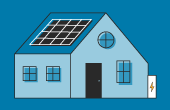Using two different types of heat pumps, we're completely off of oil for heating our space and our domestic hot water, and we did it for about $10k
50% to 74%
of electricity
$10,000
Property
- Owner:
- Elyse and Ethan Davis
- Type:
- Single-Family Residence
- Address:
- 281 Mountain Rd., Arundel, ME 04046
- Size:
- 1,600 sq ft
- Energy need met:
- 50% to 74% of electricity
- Event Participation:
- NESEA Green Buildings Open House 2013 Host
Technology
- Type:
- Solar PV
- Installed:
- January 2013
- Size of System:
- 1.9 kW
- Purposes:
- To generate electricity
Financial Details
- Gross Cost of System:
- $12,500
- Value of Rebates:
- $1,000
- Value of Tax Credits:
- $1,500
- Net Cost of System:
- $10,000
- Own or Lease:
- Cash Purchase
Professionals & Suppliers
- Products:
- Nyle Systems, Fujitsu
- Installers:
- Goggin Energy
- Financing:
- AFC first
- Energy Auditors:
- Goggin Energy
What You Need to Know
Description:
We have a Nyle systems Gyser (made in Brewer, Maine) heat pump that heats our water which is stored in a Vaughn Hotstow stone-lined 80 gallon tank (purchased via Craigslist). This is powered by an 8 panel, 1.9 kW PV array mounted on the south facing pitch of our garage roof. We also have a Fujitsu air to air heat exchanger that heats our living space, in conjunction with a wood stove (we went through about 2 cords of wood last Winter).
Other Benefits:
We are totally off of oil, and are generating versatile solar electricity. The system is also expandable - as we have available money, we can add panels and microinverters to generate more of what we use. The system operates as an air conditioner in the Summer - definitely nice to have on some of the hottest days last Summer.
Efficiency or Sustainability Improvements:
Sealed up a few of the most significant air leaks in the house.
My Motivation:
The desire increase our energy resilience/energy independence and decrease our carbon footprint.
Advice:
We like our system and don't have any complaints - for a relatively small outlay of money, it is possible to get completely off of oil. As a replacement for our oil fired system, this system is projected to pay for itself within 7 years at current energy prices. If oil goes up in cost, it will take even less time.
Experience with Installer:
Generally quite positive - there were a few minor hitches in the beginning, but the installer was diligent about getting them resolved.
View Other Case Studies
Search for Other Case StudiesThe EnergySage Marketplace





